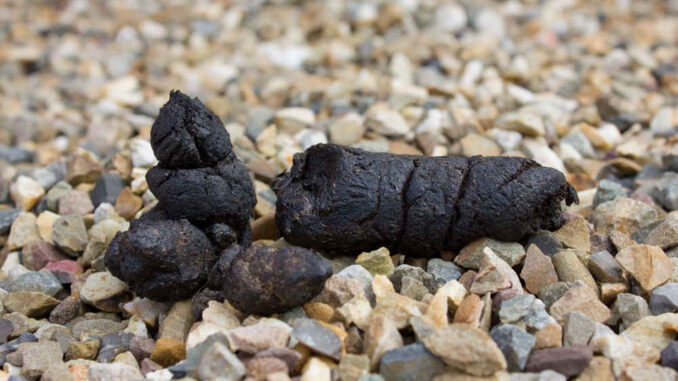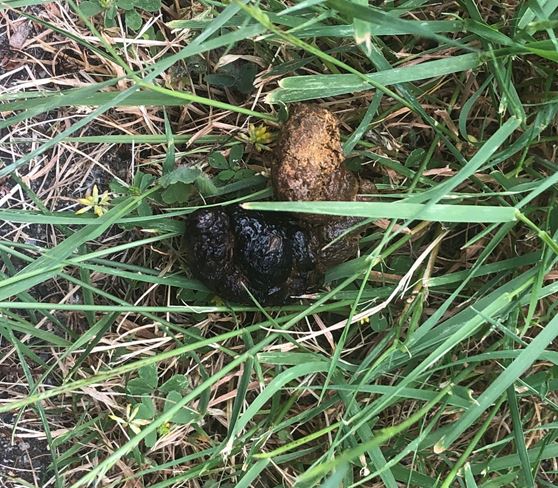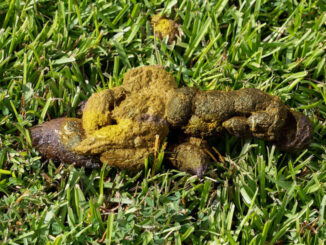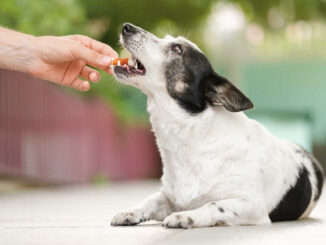
This article was updated on June 4th, 2023

We’re all aware that the normal color of dog poop is brown. It may come in different shades, and some slight variation in the brown color of your dog’s poop from day to day can be expected. What you may not be ready to find is black dog poop. Black dog poop isn’t an uncommon thing for veterinarians to see. And can be caused by many things, some that are potentially very serious. Here are the causes of black dog poop and how you can help your dog.
If your dog is a puppy, read our article: Puppy With Black Poop.
Example Black Dog Poop: Maggie, 5 Years Old
Maggie just had the following poop at the park. As you can see on the picture below, it is a mix of brown and black. Maggie is otherwise acting normal and seems completely fine:

Our veterinarian’s assessment: “This dog poop is normally formed, maybe on the dry side, and has some black color. Black dog poop can be caused by eating something black but is more often the result of blood somewhere in the upper digestive system. Instead of being red like you would expect blood to be, this blood is partially digested as it moves through the rest of the tract and turns black.
Bleeding can happen in the mouth, throat, stomach, or small intestine due to ulcers, a foreign object, inflammation from a virus or parasite, cancer, or trauma. Eating a raw diet and some medications may also contribute. If your dog makes a habit out of having black poop, see your vet.
See your vet if your dog is also lethargic, has stomach pain, vomiting, weight loss, pale gums, or weakness along with black dog poop.”
Should I be Concerned if My Dog is Acting Normal?
Even though a black color can commonly mean blood in your dog’s poop, it doesn’t always. If your pup is otherwise acting normal with a good appetite and energy level, you may choose to monitor for more black bowel movements. If your dog’s poop is normally formed, not soft or runny, or excessively smelly, or if you just started a new diet or medication, waiting to speak to your vet will usually be fine.
If your dog is acting normal and not showing any other signs of illness, you may choose to wait 24-48 hours to see if your dog’s poop becomes normal again. If your dog’s poop is still black after 2 days, make your dog an appointment with their veterinarian.
2 Steps You Can Take At Home
If this is your dog’s first black poop and they don’t have any other signs, you may try these things at home before getting your veterinarian involved.
1. Check For Injuries
Look in your dog’s mouth and throat for any signs of injuries that may cause bleeding. You can also gently push on their abdomen to check for tenderness in this area. Check gums for color and capillary refill time by gently pressing your finger on it. The gums should momentarily turn white but then return to pink within two seconds. If gums are pale or capillary refill time is slow, or if you notice any bleeding injuries, see your vet.
2. Monitor
Be sure to keep an eye on your dog’s bowel movements for the next few days to see if the black color remains or if the consistency changes. You’ll also want to note any changes in behavior, appetite, energy level, and watch for other signs of illness. If your dog just started a new dog food, especially a raw diet, the black color may remain. As long as the consistency is normal and your dog is acting fine, the black color is more than likely a pigment issue, but don’t be afraid to contact your vet if you’re unsure.
Most Common Causes of Black Dog Poop
Black dog poop is most often an indication of blood in the feces. Blood that is digested will turn from red to black, giving the poop a black, tarry color. Causes that could lead to blood in the feces include:
1. Ulcers
Ulcers in the stomach or upper intestine can lead to bleeding that turns a dog’s poop black. Ulcers can be caused by a bacterial infection, medications, or ingesting a toxin. Along with black dog poop, you may also see vomiting with blood or what looks like coffee grounds, lethargy, and not eating. Ulcers will require veterinary treatment including fluids, blood transfusions, and medications.
2. Hemorrhagic Gastroenteritis
Gastroenteritis refers to inflammation in the digestive tract; hemorrhagic means bleeding. Infections, eating something they shouldn’t, toxins, or stress can all contribute to coming down with hemorrhagic gastroenteritis. Dog poop may be black or red, and will typically be soft or runny. Vomiting, not eating, lethargy, and dehydration are also common. Most cases will require veterinary attention due to rapid loss of fluids. Rehydration with fluids, anti-vomit medications, and hospitalization may be required.
3. Parasites
Adult internal parasites attach to the linings of the intestines. Heavy worm loads can contribute to bleeding into the digestive tract, which then turns dog poop black. It may be formed or soft, and may contain eggs or worms in it. Dogs may also have weight loss, a dry, brittle hair coat, and weakness. Dogs will need to be given a dewormer to treat.
4. Trauma/Foreign Objects
Any injury or foreign object stuck anywhere along the digestive line can lead to bleeding that turns poop black. Sticks, bones, toys, or chewing on something sharp can all be culprits. Trauma that causes internal bleeding can also be a cause. Getting hit by a car, falling off something, or getting kicked may all lead to bleeding in the digestive tract. Dogs may also vomit, not eat, have pale gums, or have stomach pain. An injury or a foreign object in the digestive tract should be checked out by a veterinarian in case surgery is needed to fix or remove it.
5. Cancer
Tumors in the mouth, throat, stomach, or intestine can all potentially bleed, leading to black dog poop. Dogs may also have weight loss, vomiting, pale gums, lethargy, weakness, or pain, depending on where the tumor is located. See your vet if you suspect cancer in your dog. Some tumors may be successfully removed surgically, some may require chemotherapy or radiation, and some may have no treatment.
Besides conditions that cause bleeding within the digestive system, other causes for black dog poop could be:
6. Medications
Some medications can cause black dog poop. A big one is Pepto Bismol, which is often given for an upset stomach, but should never be given without the express direction of your veterinarian. Iron supplements and activated charcoal are other potential medications that can turn poop black.
7. Diet
Raw diets or foods with pigments can turn dog poop black. Feces will usually be normal consistency, and your pup will feel fine. The black color can also be related to eating dirt or other dark-colored items, so pay attention to your dog’s eating habits if you start to notice their poop turning black.
See Your Vet if There is More Than One Episode Or if Your Dog is Showing These Signs of Illness
Since black dog poop is most often an indicator of blood in the feces, seeing more than one black bowel movement should warrant a vet visit. That’s especially true if your pup is showing any other signs, including:
- Vomiting, with or without blood
- Soft or runny stools
- Not eating
- Stomach pain
- Weakness
- Pale gums
- Weight loss
Any of these signs can indicate that your dog has bleeding somewhere in his digestive system that needs professional attention.
At-home Remedies
If you notice a black bowel movement or two but no other signs in your pup, you may choose some at-home remedies before calling your vet. Of course, if at any time your dog becomes lethargic, doesn’t eat, vomits, or has pale gums, see your vet.
Bland Diet
Sometimes a dog’s gut just needs a break. Give it one by offering bland, easily digestible food such as boiled chicken and rice or a little cottage cheese. Offer small amounts more frequently for a couple of days and see if your dog’s poop gets back to normal. Check out our recommended bland diets for dogs.
Probiotics
You can never go wrong with a good probiotic, especially when something is off with your dog’s digestive system. There are many commercial options available, but if you’re in a pinch, a little plain yogurt can work as well.
Hydration
Your dog needs to keep drinking no matter what color their poop is. Make sure to keep plenty of clean water in front of them at all times. If your dog isn’t drinking a lot, entice them by adding a little low-sodium chicken broth to their water for a little flavor kick. You may also mix in a little canned food to make a very watery slurry.
If your dog’s black poop isn’t back to normal in 48 hours or they start showing any other signs, get them to your veterinarian.
Diagnosis
Physical exam: Your vet will start with a thorough exam where they check your dog’s mouth and gums, feel their throat and stomach, and potentially do a rectal exam to check for bleeding.
Fecal test: A fecal test will be able to tell if there are blood or parasites.
Other diagnostic tests: Blood work and x-rays or ultrasounds may be done as well to determine where the bleeding is coming from. Occasionally, gastroscopy may be used to further visualize the inside of the digestive tract and to take samples.
Possible treatments
From there, your vet will start treatment depending on the diagnosis. Fluids may be given if a dog is getting dehydrated. More serious bleeding may require a blood transfusion. Dogs with ulcers and hemorrhagic gastroenteritis may also get antibiotics, anti-nausea medications, and gastroprotectants. Foreign objects may require surgery to remove. Heavy parasite loads will need to be treated with a dewormer.
Costs
There is going to be a wide range of costs associated with black dog poop. A minor injury to the mouth or a parasite issue may cost $100, while a surgery to remove a foreign object may run you over $5,000. Hospitalization with fluids and blood transfusions for a severe case of hemorrhagic gastroenteritis can cost $500-$5,000. A tumor in the digestive tract may cost over $2,000 for surgery and another $2,500-10,000 for chemotherapy.
Other Tips to Know About Black Dog Poop
- Pay close attention to your dog’s eating habits. If they like to snack on dirt or compost, they may also end up with black dog poop. If you give medications or supplements, pigments in those products may be causing the color change.
- If possible, bring a sample of the black dog poop with you to the vet. The fresher the sample, the better. This will allow your vet to get a good look at the color and consistency, as well as give them something to work with to run any diagnostic tests they may need.
- Take a picture. If you can’t get a sample, take a picture of your dog’s black poop to give your vet a visual. While they won’t be able to use it for tests, they will get a feel for the color and consistency.
Disclaimer: This website's content is not a substitute for veterinary care. Always consult with your veterinarian for healthcare decisions. Read More.





Be the first to comment